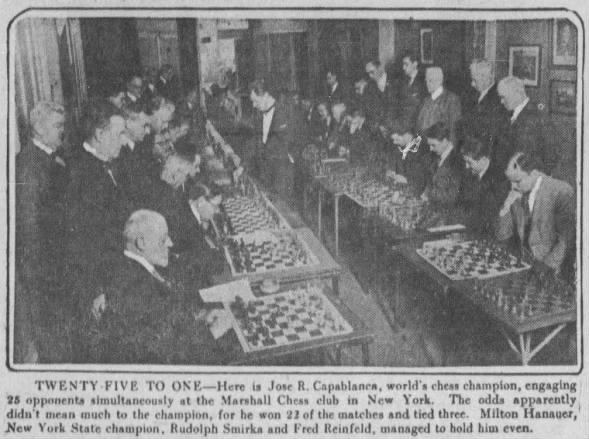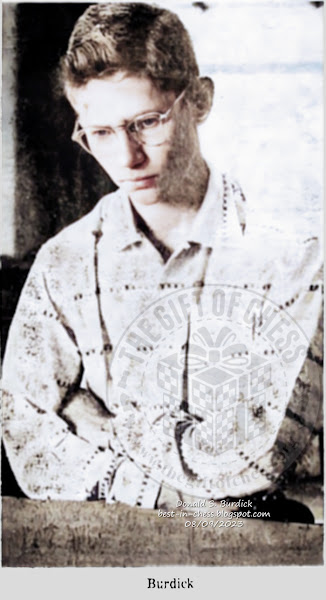February 07 1956
Buffalo Courier Express, Buffalo, New York, Tuesday, February 07, 1956
Xavier Tartakower
Paris, Feb. 6 (AP)—Xavier Tartakower, a grand master of chess, died last night in his hotel room. He would have been 69 on Thursday.
Tartakower was born in Russia of Austrian-Polish parents. He first gained fame in chess circles during a tournament in Nuernberg, Germany, which he won in 1906. Later he often played in international tournaments and wrote several books on the subject.
February 09 1956
The Guardian, London, Greater London, England, Thursday, February 09, 1956
OBITUARY
Dr. Tartakower
Dr Savielly Grigorievitch Tartakower, who died in Paris on Monday at the age of 68, was one of the outstanding chess masters of his time and a prolific and witty writer on the game.
For a great part of his life Dr. Tartakower lived in Paris, but some of his best games were played as a representative of Poland in the international team tournament between the two world wars. His readiness to experiment with unusual openings and to seek complications in the middle game made his results uneven and prevented him being a serious world championship contender. But he gained first prizes in the important tournaments at Hastings 1926, 1927, and 1945, Liege 1930, and Venice 1947, besides tying for first place with Nimzovitch at London, 1927.
His writings, along with those of Nimzovitch and Reti, did much to make known hyper-modern strategy in the nineteen-twenties, and his stimulating and witty style, equally present in his conversation, gained him a world-wide reputation. His most important works were “The Hyper-modern Game,”; “The Breviary of Chess,” “A Compendium for Beginners,” and “500 Master Games of Chess” and “100 Modern Master Games of Chess” (both in co-operation with J du Mont), a collection of the most important games of chess history.
February 18 1956
The Gazette, Montreal, Quebec, Canada, Saturday, February 18, 1956
Passing of Dr. Tartakower
Dr. Savielly Tartakower, one of the all-time greats of international chess, died in Paris on Feb. 5th in his 69th year. He was born at Rostov-on-Don, Russian Ukraine, Feb. 21st, 1887. Obtained recognition as a master in 1906 when he won the Haupt-turnier of the Nuremberg congress and in the international at Vienna the following year placed 5th among 14. Served under the Austrian flag in World War I and settled in Paris afterwards. His only visit to America came in the New York international. Secured a doctor of law degree at Univ. of Vienna in 1909 but never practiced, devoting his life to journalism and chess in both of which he was active up to the last. He humorously regarded himself as a Dr. Faustus who had succumbed to the blandishments of the Chess Debbil! Competant critics held the opinion that he could have become world champion if he had cared sufficiently to submit to the necessary discipline, but his brilliant and original mind was attracted to the adventurous along paths that led to endless experimentation in every phase of the game.
J. S. Morrison, Toronto, and D. A. Yanofsky, Winnipeg, are the only Canadians who met him in serious competition, although George Marechat of this city got to know him well in visits to Paris during the last quarter of a century. Tartakower served in the Free French Forces under General de Gaulle in World War II, adopting the nom de guerre of Lt. Cartier for some reason.
Brilliancy prize game from the St. Petersburg International, 1909:
Savielly Tartakower vs Carl Schlechter
St. Petersburg (1909), St. Petersburg RUE, rd 17, Mar-09
King's Gambit: Declined. Classical Variation (C30) 1-0
(Notes abbreviated from those by Dr. Tartakower and Dr. Emanuel Lasker.)
10. O-O P-KR3 (a) An unnecessary weakening of the K side, as the attack 111. BxN RxB; 12. N-N5 R-K2; 13. Q-R5 P-KR3; 14. NxP? Q-K1 would result in the loss of a piece for three P's. The correct play for Black was 10. … N-Q2; 11. QN-Q2, N(2)-B3 meeting development with development and avoiding the K side weakness.
14. NxP (b) “A pretty and accurately calculated sacrifice, which, with one stroke, lays bare the damage done by Black's 10th move.” (Lasker)
18. BxR B-B1 (c) Q-Q5ch was threatened. If 18. … B-K3; 19. NxB QxN; 20. Q-K8ch, etc.
19. BxRP! Q-B3 (d) Immediately fatal would be 19. … PxB; 20. N-K5! Q-B3; 21. B-B4ch B-K3; 22. R-KB1, etc.
21. N-Q6! (e) Black must lose his Q, but the win is not yet at all easy for White.
29. P-KN4 (f) Reviving White's attack.
31. B-R7ch (g) The 'coup de grace' and the sixth piece that White has sacrificed during the game.
February 20 1956
Dziennik Dla Wszystkich, Buffalo, New York, Monday, February 20, 1956
Zmarł w Paryżu Znakomity Szachista
PARYŻ, Francja.—Ksawery Tartakower, mistrz gry w szechy, zmarł w swoim pokoju hotelowym w Paryżu.
We czwartek 9 lutego przypadala 69-ta rocznica jego urodzin.
Zmarły stal sie slawny w kolach szachowych w 1906 r. po zwycięstwie odniesionym w turnieju szachowym w Norymberdze w Niemczech.
Po tym zwycięstwie często grywal on w turniejach międzynarodowych, przyczyniając się do wyrobienia dobrego imienia polskim szachistów.
An outstanding chess player died in Paris.
PARIS, France.—Ksawery Tartakower, a chess master, died in his hotel room in Paris.
Thursday, February 9, was his 69th birthday.
The deceased became famous in chess circles in 1906 after winning a chess tournament in Nuremberg, Germany.
After this victory, he often played in international tournaments, contributing to making a good name for Polish chess players.
March 18 1956
The Press Democrat, Santa Rosa, California, Sunday, March 18, 1956
Tartakower Is No More
A great player and theoretician, Savielly Tartakower won an important game a few days before his passing. I knew Tartakower well. Paris, London, Barcelona, Sitges, Amsterdam, and many more cities in Europe were sites for our friendly encounters on the chessboard.
Tartakower was a tough man to beat, but he was too friendly a person to try to win all the time either. A well known wit and great writer, Tartakower is going to be missed by all who knew this Master of Masters.
A well known Tartkower witticism: (A Knight is called a horse in German) “In some games of chess, there are not four but six horses!”
March 29 1956
The Guardian, London, Greater London, England, Thursday, March 29, 1956
Dr. Tartakower, who died in February, was the only remaining survivor of the group of “hypermodern” players (Breyer, Nimzovitch, Reti, Bogoljubov) who did so much to advance chess ideas from the sset theories and dogma of the school of Tarrasch. Even more, Tartakower will be remembered as a man whose wit, both in his writings and personality, endeared him to three generations of players.
More than any other master he was always ready to experiment with the unorthodox. In one of his frequent post-war appearances in English tournaments he was confronted by a player who began 1. N-KR3, with which he had had some success against opponents who developed their pieces normally. Tartakower, however was throughly at home in this situation (he once played 1. N-KR3 himself in an international tournamentt and won in twenty moves) and promptly replied 1. P-Q4; 2. P-KN3 P-K4; 3. P-KB3 P-KR4; 4. N-B2 P-R5!
The game which follows was played at Munich in 1909 and is taken, with Tartakower's own notes from his book “My Best Games of Chess, 1905-1930” (Bell, 228 6d).
















































